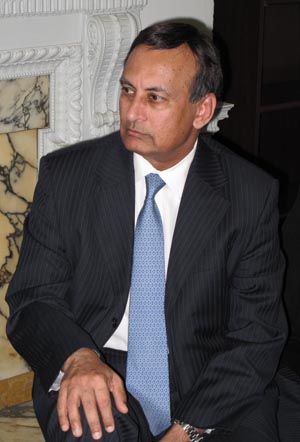Husain Haqqani: United States Must Earn Pakistani Trust
Controversial ambassador returns to his academic stomping grounds

Husain Haqqani, Pakistan’s ambassador to the United States, told an audience at Morse Auditorium last night that if the United States hopes to have a constructive long-term relationship with Pakistan, it must persuade the people of that country that it can be more than a fair-weather friend.
“There are some great things about the United States,” Haqqani told the assembly. “There are also some weaknesses, and one of them is that Americans are instinctively isolationists. When they deal with the world, they want to deal with it in their own way.”
Haqqani, a College of Arts & Sciences associate professor of international relations currently on a leave of absence, said Americans’ preference not to become engaged in other cultures, but to “get in and get out,” made many efforts unsuccessful.
“Americans need to understand that the world is not a problem for them to solve,” he argued. “The world is a situation for everyone to understand.”
The Karachi native declined to answer questions about intelligence matters or the political wishes of his government. He recently worked with U.S. Senator John F. Kerry (D-Mass.) (Hon.’05) to fashion a $7.5 billion, five-year aid package to Pakistan, a deal that has been denounced by Islamic militants and the Pakistani military, in part because it could bolster the country’s unsteady civilian government, which is locked in a power struggle with the military.
At last night’s talk, sponsored by the CAS department of international relations and the BU Center for the Study of Asia, the ambassador said that the history of American operations in Pakistan — building military bases to repel the Soviets and abandoning those bases when that conflict ended — had led most Pakistanis to doubt America’s commitment. He recounted a meeting with a tribal leader who had been encouraged to embrace the Mujahideen, then fighting the Soviets, as “freedom warriors.” Now, he said, the same tribal leader was being told that those former freedom fighters were the enemy, because they were fighting against U.S. forces.
Haqqani told his audience that Pakistan was a country that wanted to be “part of the 21st century,” a place where people favored the education of women as well as men. At the same time, until last year’s election, the Taliban was not seen to be a negative force. Now, he said, while the United States is still seen in a negative light, the Taliban has fallen from favor.
He said the challenge for U.S.-Pakistan relations is that “the United States needs to have a bilateral relationship with Pakistan based on mutual interests. Pakistan is the world’s second largest Muslim nation, with 170 million people and with nuclear weapons. It’s a country that wants to be able to move forward. It wants to be part of the capitalist system, and to do that it needs some support from the United States.”
“In my lifetime of dealing with Americans,” he said, “you are great people, but you guys don’t do patience so well. It’s a mind-set that doesn’t work in places where change is slow.”
Haqqani, who came to BU in 2004, was exiled from his homeland in 1999 for criticizing the government of President Pervez Musharraf. He is the author of Pakistan: Between Mosque and Military (2005), and has been an influential figure in Pakistani politics for decades, serving as an advisor to three Pakistani prime ministers. From 1992 to 1993 he was Pakistan’s ambassador to Sri Lanka. Last year, when Musharraf resigned and Asif Ali Zardari, husband of the late Prime Minister Benazir Bhutto, was elected president, Zardari called on Haqqani to represent Pakistan in Washington.
Art Jahnke can be reached at jahnke@bu.edu.

Comments & Discussion
Boston University moderates comments to facilitate an informed, substantive, civil conversation. Abusive, profane, self-promotional, misleading, incoherent or off-topic comments will be rejected. Moderators are staffed during regular business hours (EST) and can only accept comments written in English. Statistics or facts must include a citation or a link to the citation.